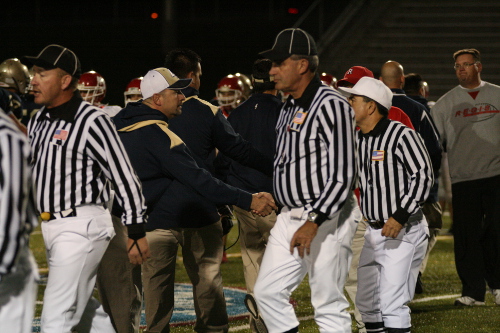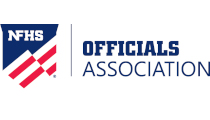What officials expect from ADs and school districts
By Bob Kersch on September 08, 2014 officials PrintSince officials first donned their officiating togs, we have been told that the schools we officiate at expect this … and this ... and this. And, when we meet these responsibilities, we’re meeting our professional responsibilities. No argument here - that’s the way it should be!
But, the schools also have a responsibility in this partnership. They too must live up to certain standards and meet certain obligations for those who are officiating and conducting those athletic contests. This article explores some of the obligations of a school district to officials.
It is said that communication between the home school and its officials is vital. It is, and it’s a two-way street. Once they’ve accepted a contest, officials are expected to honor that commitment. So must the school. Once a contest has been scheduled and accepted by an official, the school district has an obligation to conduct that contest at the scheduled time and place. And, if a cancellation is necessary, the school should advise the contracted officials as soon as possible.
A contest may also be delayed due to a variety of circumstances. It is imperative that school districts understand that an official’s time is valuable and that, should this delay be more than a few minutes, some sort of compensation should be made to the officials for this delay. They also should make every attempt to keep the originally assigned official(s) on that contest. Should an official be on-site for a contest and, for whatever reason it is canceled, the school should compensate its officials a full fee.
Speaking of compensation, the schools are expected to pay officials for their services in a timely fashion. What’s reasonable with respect to payment for services rendered is something that should be worked out during the early phases of communication between the official or officials association and the school regarding the scheduling of a contest.

We are professionals and we have every right to expect the school to provide us with safe and secure dressing facilities. Furthermore, they should provide officials with an area where, if need be, we can conference with colleagues in privacy during interludes such as halftime. Officials should never be asked to dress in an area that is accessible or used by students.
There are numerous occasions, especially during championship and invitational contests, when the services of an official are mandated for an extended period of time. On such occasions, the host institution or tournament committee should make arrangements to have a light repast available for officials.
It is expected that an official have, depending upon the sport, a variety of personal equipment that will enable them to perform their responsibilities at the highest level. It is incumbent upon the school or school district to do the same when it comes to the equipment it is required to provide. Be it a soccer goal, the bases on the field of play or a timing device, the responsibilities of the host institution require that all the necessary equipment to conduct the interscholastic contest be operational and meets all the required standards.
The nature of our society demands that security measures be taken to ensure the safety of all officials. These security measures should be not only for the duration of the contest itself, but also for the periods before and after the contest. As the saying goes, an ounce of prevention is worth a pound of cure.
Depending on the level of interscholastic contest being conducted, schools are expected to provide a variety of ancillary personnel to conduct a contest. Be it individuals to administer duties at a scorer’s table in basketball, ball boys at a soccer game, on-site medical personnel or someone to record and compute scores at a diving table, the athletic administrators have a professional responsibility to see that these individuals are not only physically there, but it is incumbent upon them to see to it that these individuals are fully trained and competent to perform the tasks assigned to them and to do them at the highest level.
Unfortunately, there are occasions when school personnel do not live up to the high standards expected of them. Coaches - being teachers as they are - are expected to conduct themselves in a professional manner. Should officials be treated to dissent and abuse by these individuals, it is mandatory that athletic administrators and the school involved institute immediate measures to see that such conduct is not tolerated. It is their duty to see that those in their charge conduct themselves in a professional manner at all times.
If schools utilize a rating system for officials to determine an official’s postseason involvement, the athletic administrators of these schools must see to it that their coaching staffs complete their ratings in an efficient and timely manner. It is also their responsibility to ensure that said ratings are comprehensive and accurate.
While it is hoped that there wouldn’t be any grievances put forth by either an official or a school or its representatives, items of this nature do arise. Therefore, it is strongly recommended that the school and/or its representatives institute measures that will take the lead when and if such situations come to the fore. Officials have the right to be heard when they or their performance have not been treated in a fair and equitable manner.
How do officials get schools and school district administrators to adhere to their many and varied responsibilities when they conduct interscholastic contests? There’s no one simple answer, but let’s take a brief look at several practices being implemented around the country that are working.
First off, under the leadership of Mike Webb and the West Virginia Secondary Schools Activities Commission, a flyer has been prepared and distributed to those who host interscholastic contests. In New York’s Long Island, officials groups have banded together to negotiate prior to the school year a variety of conditions that schools and school district personnel must adhere to when working with officials. The utilization of both of these methods help athletic administrators and school districts know what their responsibilities are, and that school personnel are expected to partner and work with officials to serve the interscholastic athlete in exemplary fashion.
Bob Kersch
A charter member of the National Federation Interscholastic Officials Association, Kersch has been a swimming and diving official since 1958. Kersch, who is chairman of the Suffolk County Soccer Officials Association Ethics Committee, is past president of both the New York State and Long Island Swimming Officials Associations. The New York State Public High School Athletic Association state swimming and diving rules interpreter since 1977, Kersch has been an official at the state championships since 1964 and meet referee since 1996. Kersch is a former member of the NFHS Officials’ Publications Committee.
Most Recent Articles
- nfhs news NFHS Learning Center Delivers 25 Millionth Course
- Track & Field/Cross Country article Effective Communication with Athletes and Coaches
- nfhs news Player Equipment Changes Highlight 2025 High School Football Rules Revisions
- Player Equipment Changes Highlight 2025 High School Football Rules Revisions
- nfhs news Judgment Call on Second Contact Eliminated in High School Volleyball






